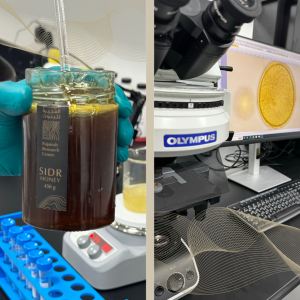
A Comprehensive Insight on Pollen Characterization and Medicinal Value
Pollen, often referred to as nature's gold, plays a crucial role in the ecosystem and has significant medicinal value. Bees, the diligent pollinators of our world, collect pollen from flowers and integrate it into honey, creating a substance rich in nutrients and beneficial properties. This blog explores the process of pollen collection by bees, its integration into honey, the importance of pollen profiling in defining honey quality, and the innovative research conducted by the Fujairah Research Centre to advance pollen analysis through modern technology.
Bees collect pollen as a primary food source for their colonies. The process begins with foraging bees visiting flowers to gather nectar. During this process, pollen grains stick to their bodies. Bees use their legs to comb the pollen into specialized structures called corbiculae or pollen baskets, located on their hind legs. This pollen is then brought back to the hive.
Once in the hive, bees mix the collected pollen with nectar and enzymes, transforming it into bee bread, which is stored in honeycomb cells. The pollen not only provides protein but also contributes to the flavor, color, and nutritional profile of honey. During the honey-making process, bees further refine this mixture, evaporating water content and adding more enzymes, which eventually results in the thick, sweet substance we know as honey.
Pollen and honey are revered for their medicinal properties. Pollen is rich in proteins, amino acids, vitamins, and minerals, making it a potent supplement for boosting the immune system, enhancing energy levels, and promoting overall health. Honey, with its antibacterial, anti-inflammatory, and antioxidant properties, has been used for centuries to treat wounds, soothe sore throats, and support digestive health.
Pollen's Specific Health Benefits can be summarized into: Immune Support: Pollen contains a wide range of nutrients that can enhance the immune system's functionality, Anti-inflammatory Properties: Pollen can help reduce inflammation, which is beneficial for conditions like arthritis, Allergy Relief: Locally sourced pollen can help desensitize the body to local allergens, providing relief from seasonal allergies. And Nutritional Supplement: Pollen is a complete food, providing essential nutrients that can improve overall health.
Pollen profiling, or melissopalynology, is the study of pollen and spores in honey. It provides valuable insights into the botanical and geographical origins of honey, which are crucial for determining its quality and authenticity.
Pollen Profiling procedure should start with Sample Collection: A small amount of honey is diluted with water and centrifuged to separate the pollen grains. Followed by Microscopic Analysis where the pollen is examined under a microscope to identify the different types of pollen grains present. Then, The identified pollen types are matched with a reference database to determine the floral sources “Botanical Identification”. Finally, Geographical Tracing carried on by knowing the floral sources, researchers can trace the geographical origin of the honey, ensuring its authenticity.
Pollen Profiling is important in Quality Control, which helps to ensures the honey is pure and not adulterated with sugars or syrups. Additionally, it indicates geographical authentication where it confirms
the origin of the honey, which is important for labeling and marketing. It also provides nutritional Information and data on the types of plants the bees visited, which can influence the nutritional properties of the honey. Pollen profiling increase the consumer confidence and builds trust with consumers who are increasingly concerned about the purity and source of their food.
The Fujairah Research Centre is at the forefront of developing advanced systems for pollen analysis and honey quality control. Their innovative approach integrates pollen profiling with geolocation and climate data to create a comprehensive identification system.
Goals and Objectives of the pollen identification advance system development in FRC are: Enhance Honey Authentication, by developing precise methods to trace the botanical and geographical origins of honey. Support Local Beekeepers, providing tools and knowledge to improve honey quality and marketability. Promote Sustainable Practices, by encouraging beekeeping practices that support environmental sustainability.
FRC Advanced Identification System consists of Integration with Geolocation Data, by incorporating geolocation information, the system can accurately trace the origin of honey. This helps in verifying claims of regional and local honey, adding value to the product. It will provide climate data analysis that helps in Understanding the climate conditions in which the honey is produced can provide insights into its characteristics and potential health benefits. The development of an extensive database of pollen types and their corresponding floral sources and locations enhances the accuracy of pollen profiling.
Research and Development consists of technology utilization by using advanced technologies such as DNA barcoding and machine learning to improve the accuracy and efficiency of pollen identification. We are currently collaborating with experts and working with botanists, beekeepers, and data scientists to refine the identification process and expand the database. We are conducting extensive field Studies to collect samples from various regions, ensuring the database reflects the diversity of flora and climate conditions.
Pollen characterization and its integration into honey not only highlight the intricate processes carried out by bees but also underscore the medicinal and nutritional value of these natural products. Pollen profiling is essential for ensuring honey quality, authenticity, and consumer trust. The pioneering efforts of the Fujairah Research Centre in developing advanced identification systems exemplify the potential for technology to enhance traditional practices, supporting both local economies and environmental sustainability. As we continue to explore and understand the natural world, such innovations pave the way for a future where nature and technology work hand in hand to improve our health and well-being.
